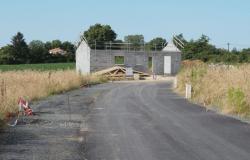“We have never seen such a fake news campaign against us,” assures Laura Daniele, from the Caritas Spain press service. “This really surprised us, especially since this campaign was orchestrated and sustained over time. NGOs have never been attacked in this way. continues this manager. Since the deadly floods in Spain on October 29, in the province of Valencia, all-out fake news have invaded social networks, from climate change deniers to anti-immigrant speeches.
Pernicious consequences
Olivia Perez, from Caritas Valencia, reached by telephone, was still lamenting a few days ago about the pernicious consequences of the video of an influencer on TikTok (3.8 million subscribers) assuring that Caritas wanted to keep everything for herself, the donations, machines to clean the streets. A video seen by more than 77,000 people. “Since then, anonymous people have called Caritas with extremely unpleasant speeches,” summarizes Olivia Perez.
In this video, this man says that NGOs are only interested in everything that is expensive, that donated clothes are thrown away. Caritas Spain had to clarify several points: “In the face of an emergency situation, it is increasingly common for fake news to increase to mislead public opinion, particularly people in vulnerable situations, with limited access to official sources. »
The situation is such that even King Felipe VI has paid the price. During a controversial and tense visit to Paiporta, one of the affected towns in the southern suburbs of Valencia, he mentioned this phenomenon while speaking with an angry local resident: “Don't listen to everything that is published because there is a lot of toxic information. Some people have an interest in anger growing, why? So that there is chaos. » Amidst the mud and anger, a very unusual statement from the king, but very symbolic.
“The panic situation reduces critical capacities”
The Red Cross was also taken to task, accused of not helping during the floods because it “only takes care of Africans”we read on the networks. Telegram, X (formerly Twitter), TikTok, Instagram, no social network is spared. More seriously, some elected officials are taking them back. A deputy from Vox (far right) from the Castile-La Mancha region assured that he had not seen the Red Cross at the disaster sites, affirming that “the aid that migrants receive when they arrive on the Spanish coast has not yet reached the towns affected by the floods”.
“Fake news has always existed”, assures Carlos Elias, professor of journalism at Carlos-III University in Madrid and holder of the Jean-Monnet chair on “EU, disinformation and Fake News”. The example of the Bonaire shopping center in one of the towns affected by the floods, where the fake news claimed “that there were a lot of bodies in the parking lot” further increased the panic.
The affair is all the more worrying as he is the presenter of a program on all supernatural phenomena, UFOs, etc. from one of the Spanish television channels which broadcast this false information, only to deny it several days later. “A real problem when an entertainment program places itself on journalistic terrain. And when digital education is lacking, it is the tribal side of a brain that takes over, assure Carlos Elias. The panic situation reduces critical capacities without forgetting that the phenomenon is part of an anti-immigration political dynamic. he continues. In government, we are worried about these expressions “anti-system”. Spain, like the European Union, is increasingly resembling the United States, assures an official source.






